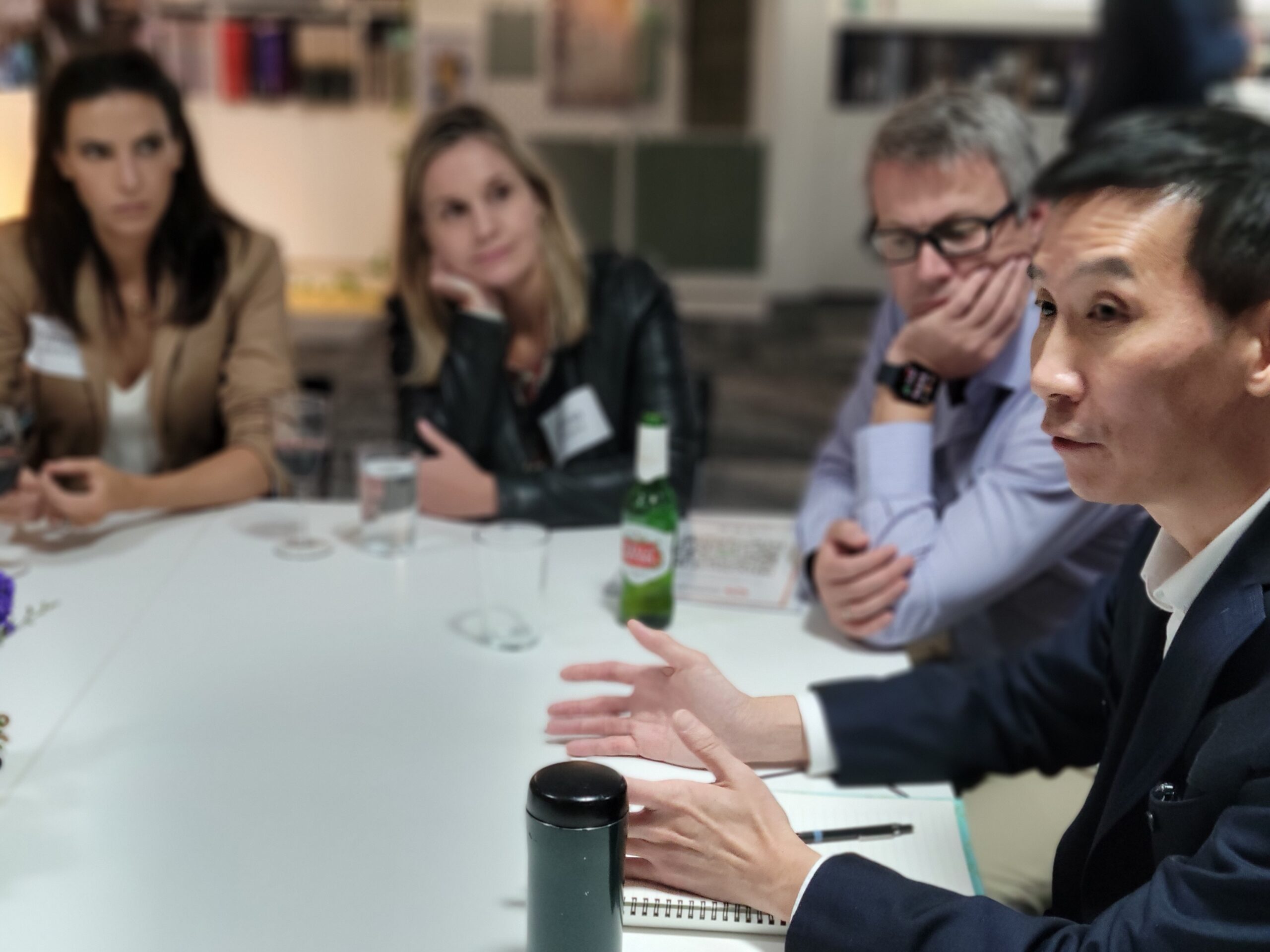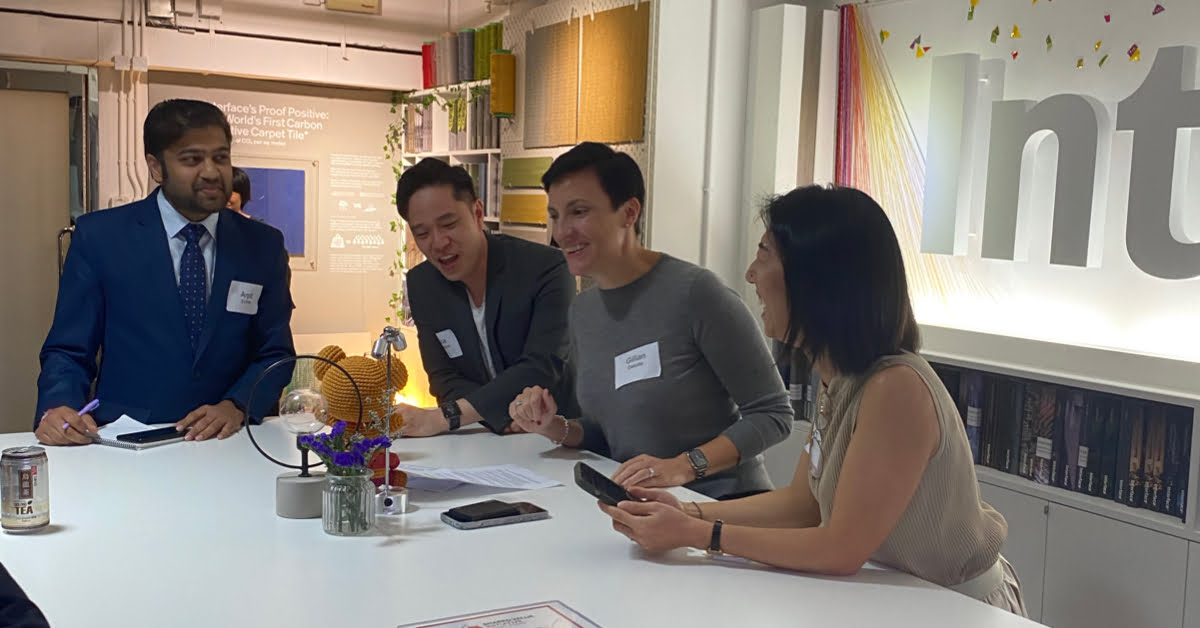Interface: Key learnings from their path to Beyond Zero

Interface Hong Kong – a company that has inspired so many of our changemakers through the documentary, Beyond Zero – opens up their door to our shared value community, for our last 2022 quarterly partners’ meeting. Check out the key takeaways of the three experts who facilitated in-depth conversations on challenges and success factors towards sustainability and purpose.
Interface, a global leader in office flooring who achieved carbon neutrality, is a core case study and success story on the sustainability journey. It was a powerful setting for our changemakers and leaders to get insights from Andy Lee, Sales Director for Greater China, who has been on a 28-year journey with Interface as they strived to reach net zero. Our expert hosts Andy Lee, Sweta Chand, Egon Zehnder, and Gillian Waite, Deloitte, led engaging roundtables on the importance of leadership, effective communications, and generations & purpose.

“The difference between corporates lies in how widely they put their values into practice”
Andy Lee, Sales Director, Greater China at Interface, took part in Interface’s sustainability journey since the beginning 28 years ago at the Maui Summit. He explains how communications play a major role in spreading purpose in the company.
- Interface employees might not all be aware of the positive impact we have collectively made on others, but once aware, the endorsement from others do motivate us to work harder towards the goal. This is why communication – internal and external – plays a crucial role in first raising awareness and then motivating employees in the long term.
- Motivating employees to go the extra mile for a good cause has to be supported by achievements that make them proud. For instance, pioneering in the Net-works program in 2012, which turns into a very successful circular business model, made me proud and fostered my motivation.
- Corporate values might be similar from one company to another, the difference lies in how widely they are put into practice by everyone in daily business decision-making. Interface make sure that every staff member puts company values into practice, by widely sharing through internal social media examples of staff embedding purpose in their daily tasks. At the sales conference, individual awards will be presented to employees who best put a key value into practice.

“Time is a luxury the world doesn’t have”
Sweta Chand, Consultant, Leadership Advisory Specialist, at Egon Zehnder led conversations about leadership and competitive advantage in the age of the sustainability imperative. She shares the main learnings from her daily work with board members, CEOs and senior leaders in Hong Kong.
- “If corporates will not, on their own, invest enough focus into sustainability and ESG issues, there are an increasing number of external factors to push them in the right direction. The tone needs to come from the top. The Board, the CEO and the senior leaders of an organisation are responsible for this, but the call is coming from all directions. Investors, shareholders, proxy advisors, suppliers, customers and even employees are demanding, through their actions, that companies pay attention to pressing issues like climate change, carbon neutralisation and sustainable practices.
- It may seem like the pressure is high, but it is only going to increase more. We are in the grey zones now with practices like carbon offsetting and companies being more focused on ‘looking green’ than actually being green. But they will not be able to hide from this responsibility for too long. Increasing regulatory requirements and responsible reporting will make it binary – you will either be sustainable or not.
- For companies to actually become sustainable, the vision needs to come from the top, but it cannot remain in the boardroom and shareholder meetings. It needs to permeate into the entire organization and become part of the culture. It needs to become a part of the everyday life of each employee and stakeholder of the organisation. While people understand that this will take time, time is a luxury the world doesn’t have. We don’t only need to stop bad practices to save what we have, we need to reverse the damage, as soon as possible”.

“Organisation’s system of KPIs, processes, etc. may make the change more challenging”
Gillian Waite, Global Workforce Partner, Deloitte, led conversations about Generations’s attitudes towards change & purpose at work, which finally concluded that generations are maybe not the main concern in driving change. What counts most is understanding the reason for the change. Here are Gillian’s key takeaways:
- “There are differences in how people change and respond to topics such as sustainability, and while a generational lens can be useful, perhaps these labels mask true differences between individuals. A Gen Z may have different views than a Baby Boomer, but they are both likely to embrace this topic, albeit in different ways.
- This is about change. Individually each of us needs to take the decision to do something sustainable and keep doing it. Therefore, change is not easy. Why would I / we change? Even the different terms – related to sustainability, impact, or ESG – can be off-putting. For people who do not really understand those, it is so easier to ignore and not change. Or perhaps sustainability is seen as something negative, requiring additional effort or stopping something nice like business travel and eating steak.
- Then while an individual may wish to change, their organization’s system of KPIs, processes etc. may make this more challenging. And perhaps, as someone becomes more senior (and perhaps older), being more entrenched in the system combined with greater personal commitments may increase that resistance to change, especially when compared with younger colleagues.
- Many organisations are profit-maximizing. So to drive change, consider positioning sustainability in terms of how it can create more value (and profit), better aligning the individual to the corporate. Harnessing sustainability to improve the bottom line creates the pull for sustainability in contrast with regulatory and compliance constraints. If companies embrace the change for business reasons, it will be easier to get the buy-in of their shareholders, boardroom, and investors”.

